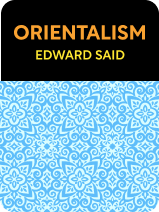

This article is an excerpt from the Shortform book guide to "Orientalism" by Edward Said. Shortform has the world's best summaries and analyses of books you should be reading.
Like this article? Sign up for a free trial here .
What is neo-Orientalism? What role did it play in the making of the Muslim stereotypes?
Neo-orientalism is a category of contemporary incarnations of Orientalist discourse. The term neo-Orientalism is generally found in modern Orientalist literature concerning predominantly Muslim countries, in particular, in the Middle East and North Africa.
Keep reading to learn about the rise of neo-Orientalism and its core assumptions.
The Rise of Neo-Orientalism
In the latter decades of the 20th century, Orientalism became recast as “area studies,” but its assumptions and power dynamics remained. Rather than being based around the scholarly study of ancient languages and artifacts, studies of the Orient were becoming more geographically based and strategic in their purpose. Building on its legacy as a partner to European imperialism, modern Orientalism became a tool of American policymaking, helping the United States formulate its response to the rapidly changing and strategically vital Middle East.
Well into the 1960s and 1970s, area studies specialists were publishing papers analyzing the failure of the “Semitic” people to produce great cultural achievements on par with those of the West. This was little more than neo-Orientalism, with crude and reductive analyses of Arabs and Muslims still finding a welcome audience in prestigious academic journals.
Figures like the Austrian historian Gustave von Grunebaum (1909-1972) argued that Islam was rooted in its classical past, unaltered by the changing world. There was no such thing as classical, medieval, or modern Islam—there was only Islam as it always had been and always would be.
For figures like von Grunebaum, the entire history and culture of the Middle East could be understood through the lens of Islam. It was the sole, all-encompassing feature of Arab life. Unfortunately, these reductive and simplistic explanations of Islam, Arabs, and their relation to Europe and America continued to have great intellectual and popular currency well into the late 20th century.
Example #1: The Cambridge History of Islam
An example of the lingering effects of neo-Orientalism can be found in the Cambridge History of Islam (1970). The two-volume history—written and edited almost entirely by European and American scholars—failed to examine Muslim theology on its own terms, instead focusing only on Islam’s history of conquest (and thus, its threats to the West) and the rise and fall of Islamic dynasties.
Among other glaring oversights, the Cambridge History of Islam also ignored the stunning cultural achievements of the Abbasid Caliphate (750-1258) and dismissed the seriousness of postwar anticolonialist politics.
Example #2: The “Clash of Civilizations”
Neo-Orientalism scholars like the American political scientist Samuel Huntington (1927-2008) have posited that there is a fundamental “clash of civilizations” between the liberal, secular West and the Islamic world.
Huntington argued in 1993 that these two religious and cultural traditions formed distinct blocs organized around irreconcilable values and worldviews. He traced the evolution of this conflict from the initial Islamic conquests and clashes with Christian Europe in the 7th century to the Crusades of the 11th-13th centuries, to the threat of the Muslim Ottoman Empire from the 15th to the 20th century, to the Israeli-Palestine conflict of our time.
The “clash of civilizations” theory held that cultural conflict between the West and Islam would form the main theatre of geopolitical conflict in the years following the Cold War. This view gained many adherents in the West, as it seemed especially prescient following the attacks of September 11 and the subsequent US invasions of Afghanistan and Iraq.
But the notion of the “clash of civilizations” is rooted in old, false Orientalist assumptions. Cultures are, in fact, syncretic and related. They influence and shape one another and do not have neat distinctions like “the Muslim world” or “Western civilization.” These are ideological constructions and invented identities. As we’ve seen, the very ability to create neat distinctions like “West” and “Orient” is itself a function of power.
Example #3: Arabs in Pop Culture
We also see the lingering effects of neo-Orientalism in the way Arabs are portrayed in Western popular culture.
These portrayals became more prevalent in Western popular culture following the 1973 oil shock, in which several Middle Eastern oil-producing states withheld American access to petroleum products to protest US support for Israel.
For consumers in the West, the resulting gas shortages and price shocks (which often benefitted American oil companies) represented a dangerous and shocking inversion of the “natural” order. Here, for the first time, was the Orient exercising its autonomy and exerting economic power over the West.
The cultural impact of the oil shock in the West was significant, as Arabs became stock villains, seen as greedy dictators or violent, maniacal terrorists. Around this time, in political cartoons in American and European newspapers, Arabs began to be represented using racist caricatures featuring hooked noses, mustaches, and leering expressions. Disturbingly, these portrayals echo the depictions of Jews in the antisemitic propaganda of the Third Reich—perhaps unsurprising, given the Orientalist tradition of lumping Jews and Arabs together as “Semites.”
Beyond their physical portrayal, successful Hollywood films like Network (1976), Raiders of the Lost Ark (1981), and The Mummy (1999) depict Arabs as manipulative, cunning, lecherous, deceitful, and greedy.

———End of Preview———
Like what you just read? Read the rest of the world's best book summary and analysis of Edward Said's "Orientalism" at Shortform .
Here's what you'll find in our full Orientalism summary :
- How Western society invented the concept of Orientalism
- Why "the Orient" was thought of as a different, exotic, and dangerous place
- How Orientalism was central to European colonialism






